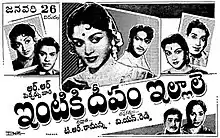Intiki Deepam Illale
Intiki Deepam Illale (transl. Wife is a Light to the House) is a 1961 Telugu-language drama film, produced by T. R. Ramanna under the R. R. Pictures banner[1] and directed by V. N. Reddy.[2] It stars N. T. Rama Rao, B. Saroja Devi, Jaggayya [3] and music composed by M. S. Viswanathan & Ram Murthy.[4] The film was simultaneously made in Tamil as Manapanthal (1961); both versions were based on the American film Sabrina (1954).[5]
| Intiki Deepam Illale | |
|---|---|
 Theatrical release poster | |
| Directed by | V. N. Reddy |
| Produced by | T. R. Ramanna |
| Written by | Acharya Aatreya (dialogues) |
| Story by | Thuraiyur K. Murthy |
| Based on | Sabrina (1954) |
| Starring | N. T. Rama Rao B. Saroja Devi Jaggayya |
| Music by | Viswanathan-Ramamoorthy |
| Cinematography | V. Gopi Krishna |
| Edited by | R. Raja Gopal |
Production company | R. R. Pictures |
Release date |
|
Running time | 135 mins |
| Country | India |
| Language | Telugu |
Plot
Raja Shekar (N. T. Rama Rao) & Chandra Shekar (Jaggayya) are brothers hailing from a Zamindar family. The elder one, Raja Shekar is good in nature, but an alcoholic, while the younger one Chandra Shekar is a successful medical practitioner at Madras. Chandra Shekar stays as a tenant in the house of widowed Devamma (Malathi) and her daughter Malathi (E. V. Saroja), who loves him. However, on a rail journey to his hometown, he meets an elderly man, Dharmalingam (Chittor V. Nagaiah) with his daughter Suguna (B. Saroja Devi) and both fall in love, hoping to marry soon. Meanwhile, Seetamma (Kannamba) mother of Raja Shekar and Chandra Shekar is worried about his drunkard son, hopes marriage will reform him and fixed his marriage with a girl, none other than Suguna, without realizing that her younger son is love with her. Suguna also realizes that the bridegroom is different in the last minute of marriage. To keep up her father's prestige she performs the marriage. The wedding happens, and Chandra Shekar, due to an accident, is unable to attend it and has no knowledge that the bride is his sweetheart Suguna. Later, when he meets her, he is shocked. The husband suspects his wife and brother when he comes to know she was her sweetheart earlier. He decides to kill them. Meanwhile, Seetamma dies, leaving behind all the property to her daughter-in-law. Now, Chandra Shekar puts on an act of having become on alcoholic and makes overtures to his sister-in-law Suguna, who slaps him. Watching this, her Raja Shekar realises the truth and apologises to her. The family is reunited. While on a train journey, Chandra Shekar notices a young woman lying on the railway track to commit suicide, who is Malathi and still in love with him. The two marry and live happily.
Cast
- N. T. Rama Rao as Raja Shekar
- B. Saroja Devi as Suguna
- Jaggayya as Chandra Shekar
- Relangi as Dr. Avataram
- Ramana Reddy as Astama Jyothishkudu
- Chittor V. Nagaiah as Dharmalingam
- Vangara as Sidhanthi
- Kannamba as Seetamma
- Girija as Navami
- E. V. Saroja as Malathi
- Malathi as Devamma
Soundtrack
| Intiki Deepam Illale | |
|---|---|
| Film score by | |
| Released | 1961 |
| Genre | Soundtrack |
| Producer | M. S. Viswanathan & T. K. Ramamoorthy |
Music composed by Viswanathan–Ramamoorthy. Music released by Audio Company.
| S. No. | Song Title | Lyrics | Singers | length |
|---|---|---|---|---|
| 1 | "Vinumucheli Thelipedanu" | Sri Sri | P. Susheela | 3:07 |
| 2 | "Pongi Pongi" | Acharya Aatreya | L. R. Eswari | |
| 3 | "Neeve Neeve" | Acharya Aatreya | P. B. Srinivas, P. Susheela | 3:45 |
| 4 | "Oke Raagam Oke Taalam" | Acharya Aatreya | P. Susheela | 3:39 |
| 5 | "Yevariki Vaaru Kapala" | Acharya Aatreya | P. B. Srinivas | 4:09 |
| 6 | "Ammayigariki" | Sri Sri | Pithapuram, Rajeswari | 3:12 |
| 7 | "Vinumucheli Thelipedanu" (Pathos) | Sri Sri | P. Susheela | |
| 8 | "Kapupupanta Kodukulani" | Acharya Aatreya | P. Susheela |
References
- "Intiki Deepam Illale (Banner)". Chitr.com.
- "Intiki Deepam Illale (Direction)". Filmiclub.
- "Intiki Deepam Illale (Cast & Crew)". gomolo.com.
- "Intiki Deepam Illale (Preview)". Know Your Films.
- Guy, Randor (26 April 2014). "Manapandhal (1961)". The Hindu. Retrieved 3 March 2018.